Electric charges of the same sign repel each other, while electric charges of different signs attract each other. Electrons(-) repel electrons(-). Electrons(-) attract protons (+). Those charges need no medium to transfer this force. Vacuum is enough for an electric charge to 'feel' the other electric charge.
A power supply usually has two wires coming out of it, or two terminals to connect wires to.
The power supply acts as if it is putting more electrons on one terminal than on the other terminal.
When you connect a wire between the terminals, electrons from the wire will be repelled by the terminal with more electrons and attracted to the terminal with less electrons. It will feel this force and move, and his movement can do work.
The more electrons one terminal has than the other terminal, the bigger the force this electron will 'feel'. Bigger forces can accelerate electrons to higher speeds. This is proportional to the voltage.
Imagine buzzilions of electrons repelling together a electron on the wire. This electron will be able to do a lot of work before reaching the other terminal of the power supply.
Now if you have only a few electrons more on one electrode than on the other electrode, the wire electrons won't be pushed too hard by them and will not be able to do much work, which means less voltage.
This analogy only serves for a DC power supply. In the case of AC power supplies, like the wall outlets, the charge difference between power supply terminals oscillates from one terminal to another around 50 times per second due to the way power generators work. But that is another question.
Bu yanıt yardımcı oldu mu?
Oy verildi
Geri al
Puan
0
İptal
Bu yoruma uygun yeri bulmak için bu konuyu kaydırın. Ardından, taşımak için "Bu yazıya yorum ekle"ye tıklayın.

 4
4  8
8  2
2 